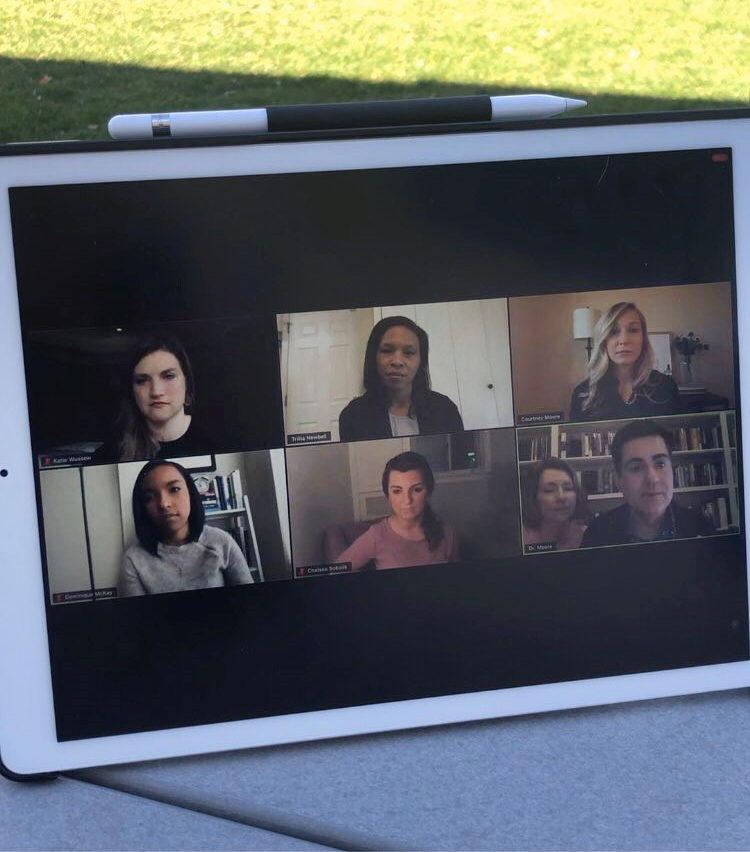
WASHINGTON (BP) — Panelists discussed how Christian women should approach work from a biblical perspective, especially during the coronavirus (COVID-19) pandemic, in a first-of-its-kind webinar sponsored by the Southern Baptist Ethics & Religious Liberty Commission.
 The online conversation — titled “Christian Women at Work: Working From Home” — took place April 21.
The online conversation — titled “Christian Women at Work: Working From Home” — took place April 21.
Chelsea Sobolik, a policy director for the ERLC in its Washington, D.C., office and the host of the webinar, told Baptist Press in written comments the goal is “to have open and honest conversations about the opportunities and challenges working women face and how to navigate them as Christians. My desire is for women to be encouraged and know that they are not alone in their work situations.”
ERLC President Russell Moore welcomed the more than 350 participants to the online discussion, saying the pandemic is a catastrophe in terms of work as well as health. In a time of anxiety over work and providing for families, he said it is important for Christians to remember, he said, “[Y]ou’re an heir, and that means that you’re loved not because of your performance and not because of paying your way but because you’re a son and a daughter.”
Establishing boundaries was among the recommendations made by panelists for handling the limitations of stay-at-home orders and social distancing during the pandemic.
Boundaries are “massively important,” and it’s vital to have “really clear priorities,” business coach Katie Wussow said. The mother of two has three items on her to-do list each day, she said. “[T]hat’s all I get.”
It is acceptable to feel “out of balance,” Wussow said. “[I]f you feel out of balance, it doesn’t mean you’re not being faithful to what God has called you to do. You may not have peace in your situation, but you have peace in Christ.”
Author Trillia Newbell acknowledged, “Trying to figure out how best to serve my family in the midst of serving an organization or writing or doing things like this [webinar] has been a unique challenge.”
For her, communicating well with her husband and two children, knowing her limits, setting boundaries and doing a schedule have been important, Newbell said.
Dominique McKay — a long-time congressional staff member — said work at home can become “all consuming” since she lives alone. “I set boundaries, but I’m flexible too with how I feel each day,” she said.
Since she has been restricted to home, McKay said she has been sending cards of encouragement to friends, co-workers and members of her church family.
In a biblical overview of work, Newbell told the online audience God “displayed His awesomeness” in the six days of creation. Because God is perfectly righteous, “we can conclude work is not sinful nor is it a result of sin. Work is good and glorious,” she said. “Work is a part of God’s design for His creation.”
Sin, however, changed work’s nature, and the human response to work can include resentment, laziness and even worship of it as an idol, Newbell said. Yet, the Gospel of Jesus provides hope.
“We don’t have to hate work or worship work because of Jesus,” Newbell said. “We can indeed do all things to the glory of God by His grace and His strength. [W]e find the greatest freedom to enjoy work in understanding our satisfaction, and joy can only be derived” from Jesus.
Newbell serves as the ERLC’s director of community outreach and an acquisitions editor for Moody Publishers.
Courtney Moore — founder and president of Women & Work and a former missionary with the International Mission Board — offered three considerations in the effort to balance work with other priorities. The mother of three said Christian women should:
— Humbly realize “all of these things will not be done perfectly.”
— Recognize “it won’t be easy.” Sacrifices and trade-offs will be required. Wisdom will be needed in both small and large decisions.
— Understand “we really can’t do it all.” Women are “limited, finite beings. All of this lack within ourselves really leads us to depend upon Him.”
The Gospel frees women “from the need to derive meaning and significance for ourselves from being superior to others,” Wussow said. “And it also frees us from the need to feel like we have this innate competence in ourselves to be able to handle the things that the Lord has given us.”
McKay shifted her perspective on work about halfway through her time on Capitol Hill, she said.
She began to see her job “as time spent investing in people and the relationships that I had and not just simply in the work that I was doing,” McKay said. “And I started to measure success by what God was doing in the lives of those people and through me for them. That changed everything and really made work much, much more satisfying.”
Watch a recording of the webinar here:
[VIMEO=410330616]
















